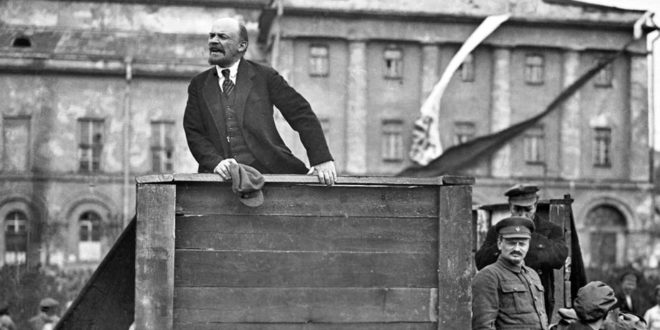Podcast: Play in new window | Download (Duration: 55:51 — 37.4MB)
It’s October 24th 2017, nearly 100 years ago to the day in 1917*, Vladimir Ilyich Ulyanov became Chairman of the Council of People’s Commisars in Russia. Ulanov is better known to us as Lenin.
Michel Foucault said in 1977 that “It is the desirability of the revolution which causes a problem today.” Well, that today being 40 years ago, and Foucault’s today being 60 years on from the Russian Revolution…we might ask, is revolution still desirable in 2017…and what shall we wish to “turn over”?
Today begins a 3 part series looking at the Russian Revolution and, as is our wont in historical matters, we shorthand this by focusing on the three primary characters in this particular drama: Lenin, Trotsky and Stalin…all “pen-names”…or nom de politique.
We will note that the 1917 Revolution began as a popular workers uprising in February on Women’s Day and was in large part a spontaneous development instigated by women workers in factories. Which is to say, it had nothing specifically to do with Lenin or Trotsky (and certainly nothing to do with Stalin).
But for most of us History is necessarily a shorthand subject. Who has time to spend years unravelling the past? And anyway, depending on what thread you pull in the weave, what’s revealed always seems to change, sometimes subtly, sometimes drastically — and always in relation to where you stand in time and space–that is to say, in your political moment.
If nothing else, the Russian Revolution reveals the uses of history for ideological purposes. For Russia’s Communism is the counterclaim to Capitalism in world historical narrative. In that way, the success or failure of a system comes pre-packaged. But as Paul Valery has been quoted: These are vulgar simplifications of things.
Today’s show is in two parts–we’ll open by looking at a particular historiography of the Russian Revolution via the American Historical Review; and then we’ll turn to Lenin, who is perhaps the founding father of Communism in Russia.
*Except, not actually…Russia used the Julian at the time, which was 13 days behind the Gregorian calendar used in Europe and the U.S. In February 1918 the Soviet government switched to the Gregorian system.
 GUESTS
GUESTS
Part One: Alex Lichtenstein is a professor in the Department of History at Indiana University and editor of the American Historical Review. He’s the author, with Rick Halpern, of Margaret Bourke-White and the Dawn of Apartheid in South Africa (Indiana University Press 2016). His latest book was co-authored with his brother, Andrew, Marked, Unmarked, Remembered: A Geography of American Memory (Univ. of West Virginia Press 2017)
 Part Two: Lars T. Lih is a scholar who lives in Montreal. His books include Bread and Authority in Russia, 1914–1921, Lenin Rediscovered: “What is to be Done?” in Context, and Lenin, a Critical Lives biography from Reaktion Books.
Part Two: Lars T. Lih is a scholar who lives in Montreal. His books include Bread and Authority in Russia, 1914–1921, Lenin Rediscovered: “What is to be Done?” in Context, and Lenin, a Critical Lives biography from Reaktion Books.
RELATED
Lenin and His Biographers (ISR) by Paul Le Blanc
Lars Lih online: Recent studies on Bolshevism, Lenin, and Kautsky
In the Back Issues: American Historical Review and the historiographical transformation of the October Revolution by Alex Lichtenstein
MUSIC
“The Internationale” performed by Billy Bragg
“Lenin (Requiem)” composed by Hanns Eisler (Libretto by Bertolt Brecht)
“Eisler On the Go” by Billy Bragg (lyrics by Woody Guthrie)
Credits
Producer & Host: Doug Storm
Assistant Producer: Rob Schoon
Studio Engineer: Wes Martin
Executive Producer: Wes Martin
 WFHB Bloomington Community Radio
WFHB Bloomington Community Radio


